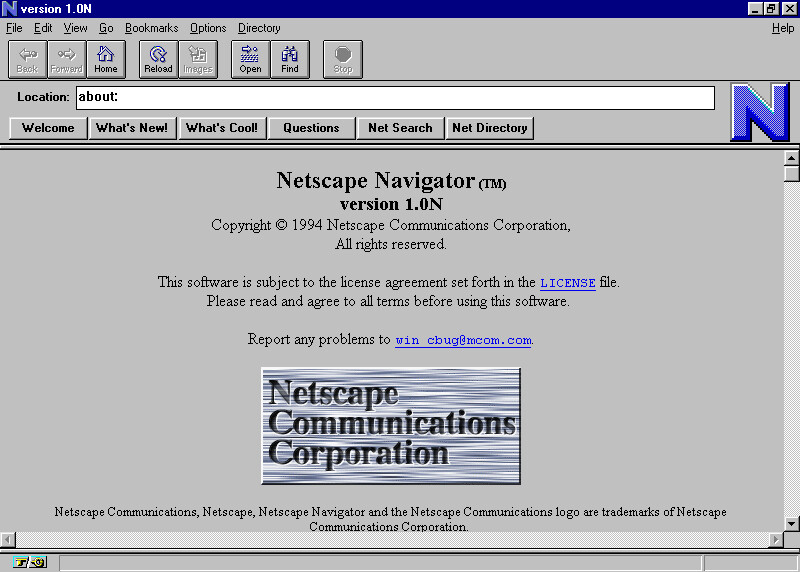A few months ago, we noted the 30th anniversary of the launch of the Mosaic web browser by the National Center for Supercomputing Applications (NCSA). While it wasn’t the first web browser ever made, it certainly had a ton of innovations over previous browsers, and it started the ball rolling on the use of the World Wide Web to access information on the internet.
We also noted that about a year after the launch of Mosaic, one of the browser’s co-creators, Marc Andreessen, left NCSA to form a business. With the help of former Silicon Graphics founder Jim Clark, he created Mosaic Communications Corporation, which was later renamed Netscape Communications Corporation after the NCSA objected to the use of Mosaic in the company name.
On October 13, 1994, Netscape Communications Corporation issued a press release announcing its plans to release what it called the Netscape “network navigator”, starting with a beta version. On December 15, 1994, 29 years ago this week, Netscape Navigator 1.0 was released for Windows 3.1, Macintosh System 7.0 and UNIX X Window System.
Netscape Navigator 1.0 included what would become standard features on other web browsers such as loading images and text from a web page at the same time, support for the popular JPEG image format, hierarchical bookmarks, and a generally improved user interface.
One interesting thing about Netscape Navigator 1.0 was that it was the first web browser designed for commercial use. While individuals were still allowed to download the web browser for free, along with academic and non-profit groups, businesses were asked to pay to use the browser. In Netscape’s press release for the launch of version 1.0, it stated:
Netscape Communications also announced today that it is setting the single-user price of its Netscape Navigator for commercial use at $39. The pricing — which includes a 90-day warranty, 90-day online or phone support, and diskette or CD — makes it readily affordable for commercial users, giving the largest potential number of users access to commercial strength, supported technology.
The company also released a set of server products for businesses who wanted to offer services on the internet, called Netsite:
The Netsite server line includes the Netsite Commerce Server with integrated security as well as the Netsite Communications Server(TM). The Netsite Commerce Server, incorporating Netscape Communications’ Secure Sockets Layer(TM) (SSL) based on RSA Data Security technology, is the first secure server software available for the Internet. When paired with Netscape Navigator or other Internet browsers supporting SSL, the Netsite Commerce Server lets users take advantage of such commercial services as online publications, financial services and interactive shopping.
In case you are wondering, a Windows PC had to have at least 4 MB of RAM, at least 5 MB of free hard drive storage space, and a modem that could handle speeds of at least 9600 bps, although having a model with either 14,400 or 28,800 bps speeds was recommended.
The launch of Netscape Navigator 1.0 jump-started the World Wide Web revolution, even more so than the launch of Mosaic. Netscape Communications launched Netscape Navigator 2.0 in September 1995 which added even more features familiar to web browsers today, including support for JavaScript and animated GIF images.
About a month beforehand, Microsoft finally launched its first answer to Netscape, with Internet Explorer 1.0 browser in August 1995. However, it was pretty bare-bones in terms of features. Version 2.0 launched in November 1995, which included support for JavaScript.
For a little while, it looked like Netscape Communications could become the next big tech company, with its browser becoming a huge hit just as personal computers and internet connections slowly started to show up in every home and business. It even launched an IPO in August 1995 that made it a publicly traded company.
However, Microsoft’s aggressive push to develop and release Internet Explorer, combined with issues with future versions of Netscape’s browser, saw the company’s fortunes turn. But that’ is a story for another day.

